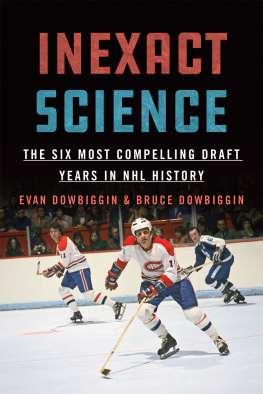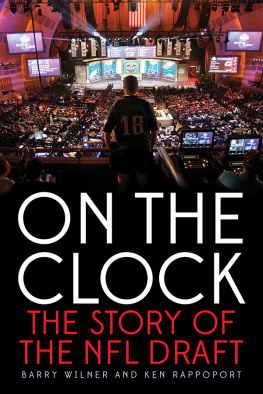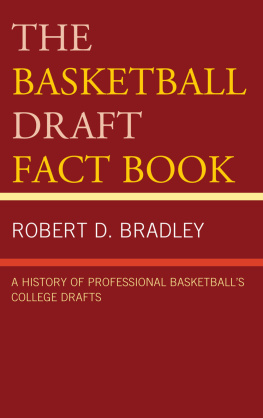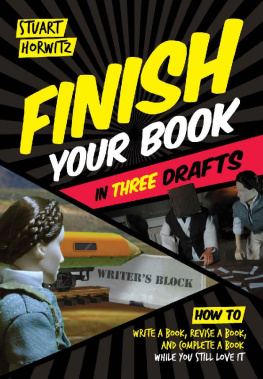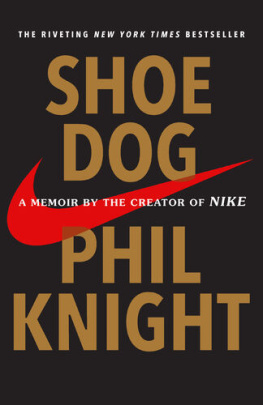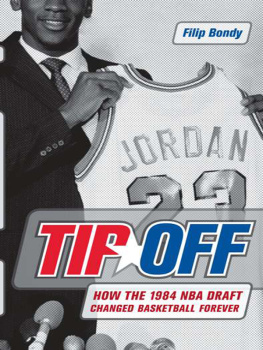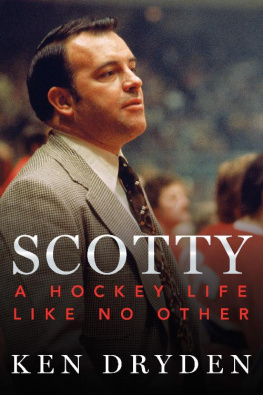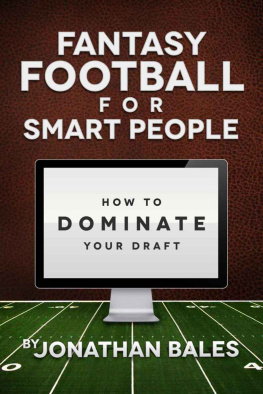Introduction
Scratch any hockey lifer and theyll tell you a great NHL draft story. One who got away. One who couldnt miss. One a team stole from under the eyes of the rest of the league. Hall of Fame reporter Eric Duhatschek remembers the 1984 draft, when he was covering the Calgary Flames for the Calgary Herald, and a random encounter that he had in that long, long day of drafting:
Back then the draft was just one day. They would start at nine in the morning. They always took a break afterIm going to say round five. I remember seeing (Flames head scout) Ian McKenzie in the break and asking him how things were going. He tells me, I cant believe Brett Hull hasnt been taken yet. This guy had an unbelievable year, and Ive been pushing, pushing, pushing for him and hes still on the board! Sure enough, I think it was 10 or 12 names that came off the board before the Flames came up at number 117. And of course, thats where they did draft Hull. I always trusted scouts who were enthusiastic about somebody beforehand rather than a year later. Saying, Wow, this guys a really great pick, and Im a genius? Ian was never like that. He was pretty honest and forthright about it. He wasnt right all the time, but he was right more often than youd think.
So Ian was asked afterwards by a bunch of people, including a reporter from Sports Illustrated, about why they drafted Brett Hull. The main question was Did you draft him because hes Bobby Hulls son? And Ians answer was No, its because he scored 105 fucking goals in the B.C. Junior League! Remember how SI used to have that section called They Said It? Well, that quote became the one they chose, without the fucking part, of course. And Ian was very proud of that. It was the only time in his life he ever got quoted in Sports Illustrated magazine.
Now fast-forward to August. In those days, the Flames were producing a newsletter that they sent out to their fans. It was just a four-page publication that you got if you were a season ticket holder. Ian calls me up and says, Can you ghostwrite it for me? Ill pay you 100 bucks for it. And I agreed to. I was doing it more as a favour than as an actual freelance assignment. Anyway, I interviewed him to get what I needed for the write-up. We went through all the players the Flames had taken, such as Gary Roberts, Paul Ranheim, Hull. Then, near the end, he says, I want to talk about this kid we took in the ninth round, Gary Suter.
This was still 1984, and it was more than a year before hed played an NHL game, so it wasnt just after-the-fact BS. It was just two months after the June draft. No one had paid even one word of attention to Suter. Ian pointed out that he had been an older player, being drafted at age 20 after being passed over a couple times. But mostly it was because of size. In those days, very few NHL teams drafted defencemen who were under six feet tall. Ian told me he had been scouting the University of Wisconsin and was in the corridor talking to a coach or staffer when a player walked by. Ian asked, Who is that? And the guy he was talking to said, Oh, thats Gary Suter. Ian replied, Thats Suter!?
Then Ian went back to look at Central Scouting, and they were still listing him at five-foot-nine or whatever. Well clearly, hed had a growth spurt! Ian watched him play as well, and it looked like he was very close to six feet tall, if not over. So basically, the Flames were sitting on him because they had this information, all based on a chance encounter while talking to somebody outside the dressing room and having Suter walk by. Thats how they ended up drafting him when they did. I put this story in the newsletter article, then typed it up and sent the draft of it over to Ian. He told me a funny story afterwards. He called me up one time and started laughing, saying, Yeah, I get all kinds of positive responses to that newsletter that you wrote in my name. Most of the time people are saying, Wow, you should do this for a living! Youre so much better than those fucking sportswriters who dont know what theyre talking about. I cant tell them you are the one who actually wrote it. Thanks for making me look good!
Suter went on to make McKenzie look more than merely good, nabbing the Calder Memorial Trophy as the NHLs top rookie in 198586, playing in four All-Star Games and serving as a key member on the blue line for Calgarys Stanley Cup championship team in 1989. Even after his days with the Flames were over, Suter would be a relied-upon contributor to the Blackhawks and Sharks and go on to play over 1,000 games in the NHL despite a bit of a late start in being drafted. At the time of his retirement, he was considered one of the greatest U.S.-born defencemen ever (before the current era, where there have been far more U.S. blueline stars than there were in Suters early days as a pro).
Yes, the draft puzzle can be defined many ways. It is the way to victory. And the road to ruin as well. From Guy Lafleur to Sidney Crosby to Connor McDavid, the annual draft of hockeys most talented young prospects has been considered the way to riches for top talents and the path to great heartache and disappointment as well. Each June, the hockey world convenes to see the games young stars chosen by their future employers (or the first of their NHL employers). Callow juniors and their parents wait for the call that will shape their destiny. Though owners and general managers have attempted to use trades and/or free agency to build their clubs into winners over the years, its the NHL draft that has proven the special sauce in creating a championship-calibre operation. Since the introduction of a hard salary cap in 2005, an even greater onus has been placed on drafting.
Inexact Science will tell the curious and captivating events of the NHL drafts five-plus decades through the six most compelling years in its history. In addition to analyzing these top draft years, Inexact Science will show the lessons learned from the process of guessing hockey horoscopes, how it changed the business of the game and finally where the draft is headed. By looking at what history has shown, the epilogue will demonstrate how the best organizations in pro hockey today have expertly played the crapshoot of the draft. The inexact science of sure shots or diamonds in the rough, but also of the supposed cant-miss prospects who indeed did somehow missand the general managers who paid the price for getting it so wrong.
There have certainly been controversies, blockbuster trades, innovative ideas and/or plain old bad judgement in these six most intriguing years. As Vancouver Province columnist Tony Gallagher put it, riffing on infamous words from Todd Bertuzzi, The draft is what it is. Read, watch and listen to whatever you like, but make sure the bullbleep filter is cranked to the max when consuming this piffle. For example, just how did the Detroit Red Wings get the jump on the European talent bonanza (namely the Russian revolution) to propel them to a quarter century of runaway success? Why were Sam Pollocks Montreal Canadiens able to exploit the inexperience and mismanagement of the NHLs bumbling expansion teams to their benefit at the draft, en route to Stanley Cup after Stanley Cup? And why is 1979 considered perhaps the greatest draft of all time, and how did it come to be seen that way?

